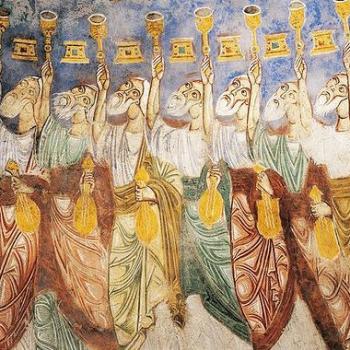Denomination of the Week: Church of God (Anderson, Indiana)
I realize that I am not keeping up with my intention of commenting here about a different American denomination every week, but I will occasionally post essays here about various denominations. For those of you who were not around when this series began: I have accepted the editorship of the Handbook of Denominations in the United States 14th edition. I tend to post essays here about smaller, lesser-known denominations to make people aware of them. Most people have some acquaintance with the so-called “mainline” denominations and other larger ones. (Sociologists of religion traditionally labeled eight Protestant denominations the “mainline” ones because of their ecumenical relationships—all at one time had offices in the “God Box” building in New York City—and because they were considered especially influential in American culture including politics. They were/are: The Episcopal Church, the United Methodist Church, the Reformed Church of America [“Dutch Reformed”], the United Church of Christ, the Evangelical Lutheran Church, the American Baptist Churches, the Disciples of Christ, and the Presbyterian Church [U.S.A.]. So my mission in this series is to raise awareness of some of the lesser-known denominations.
I also tend to write about denominations with which I have had some “close encounters”—via family, friends, speaking events, or something else.
Today’s “Denomination of the Week” is the Church of God (Anderson, Indiana). Why the parenthetical phrase? Because there are many denominations called “Church of God” and the other relatively large one from which the Anderson, Indiana group wants to distinguish itself is the Church of God (Cleveland, Tennessee). Both denominations have churches in the same cities and towns, so they added the names of their headquarters cities to their names so people can know which is which when they see two “Churches of God.” Of course, a “Church of God” might belong to neither of these two groups. But these are the two largest denominations using that name and they want to distinguish themselves from each other. The Cleveland, Tennessee group is Pentecostal; the Anderson, Indiana one is not.
When I was growing up in the Upper Midwest my father’s mother’s family included many members of the Church of God (Anderson, Indiana). According to the story, which I have recently confirmed with a long-time Church of God member and resident historian of the particular area, when my grandmother’s large family immigrated to the U.S. and settled on the mostly empty plains in the late 19th century, the only church within walking or even buggy-riding distance from their homestead was a tiny Church of God mission—far, far from where the denomination began. They, my grandmother’s family, were Lutherans back in the “old country,” but joined the Church of God sometime after settling on the prairie of eastern South Dakota. That tiny Church of God mission has long been closed and the building is gone. But many of my great aunts and uncles and their children and grandchildren—my uncles and aunts and cousins—remained in the Church of God as they moved to new places. So large was that family (my grandmother had eleven siblings!) that one of my best friends in junior high school turned out to be my second cousin. We didn’t discover that until we had already been friends for two years! (We both have very common Scandinavian surnames.) He and his family (my father’s cousin and his family) attended the Church of God in the Upper Midwest City where they and my family lived (but my father was not close to his cousin).
While I was in seminary in that city my uncle invited me to preach twice at the little Church of God there. About that time I discovered that my father, who eventually became Pentecostal, was baptized in that little church when he was sixteen and staying during a summer with his older sister in that city. My grandfather’s funeral was held in the Church of God in Brookings, South Dakota. (His wife, my grandmother who grew up in the tiny Church of God mission out on the prairie north of Brookings, became Pentecostal. Her funeral was in a Pentecostal church.) I clearly remember some of my Church of God relatives insisting that theirs was not a denomination but a movement and that all true Christians belong to them because they are the true Church of God.
The Church of God (Anderson, Indiana) was founded by Holiness (Wesleyan) preacher Daniel S. Warner (1842-1895) which is why one of the denomination’s colleges in the U.S. is called Warner Pacific College (Portland, Oregon). Warner, like other American Christian revivalists of the time, believed that the very existence of denominations was a scandal and that there needed to be a unified Christian movement to which all true Christians would belong—whether they were aware of it or not. (This is similar to the beginnings of the Campbell-Stone movement that gave rise to the Churches of Christ.) The Church of God (Anderson, Indiana) has always resisted formal membership on the ground that all true Christians are members. (Don’t ask me exactly how that works when a church business meeting is held!)
The Church of God (Anderson, Indiana) is evangelical and holiness in theology and practice. It is Arminian in flavor and Holiness but not Pentecostal in emphasis. In other words, historically, anyway, the Church of God (Anderson, Indiana) teaches a second experience after conversion/regeneration called sanctification. One thing the Church of God (Anderson, Indiana) is now known for is its integration of Caucasians and African-Americans in their churches. While not all individual congregations are integrated, integration is an emphasis of the denomination and it has many integrated, multicultural churches. The denomination also ordains women to pastoral ministry. It is considered progressive compared with many conservative evangelical denominations—especially with regard to women’s leadership and racial integration and ministry to disadvantaged populations. Like many Pietist churches, the Church of God (Anderson, Indiana) practices foot washing as a third ordinance after believer baptism and the Lord’s Supper.
The Church of God (Anderson, Indiana) operates Anderson University (Anderson, Indiana) which is a well-known and highly regarded evangelical liberal arts and sciences school that has produced many Christian musicians and recording artists (e.g., Bill and Gloria Gaither). The denomination also operates Warner Press, a publishing house primarily dedicated to church materials. The denomination is headquartered (in the United States) in Anderson, Indiana and has about 2,250 churches and 253,000 adherents. Worldwide it has almost a million worshipers.
A fine evangelical theologian is Barry Callen, now retired from Anderson University School of Theology (the denomination’s seminary). Barry is a good friend who has written several fine books of theology including Discerning the Divine: God in Christian Theology (Westminster John Knox Press, 2004).












